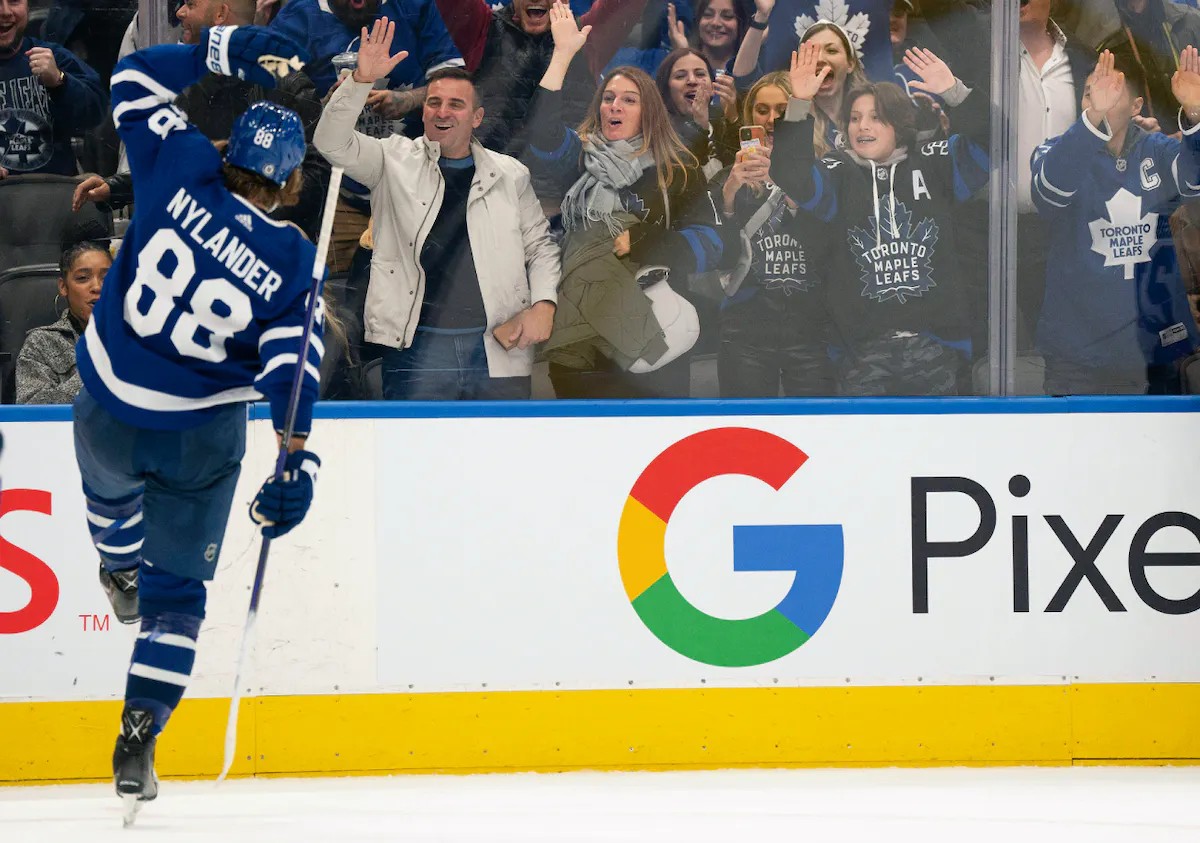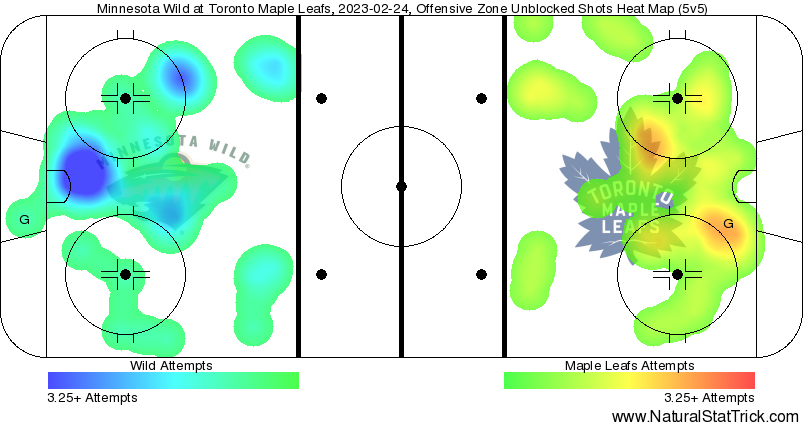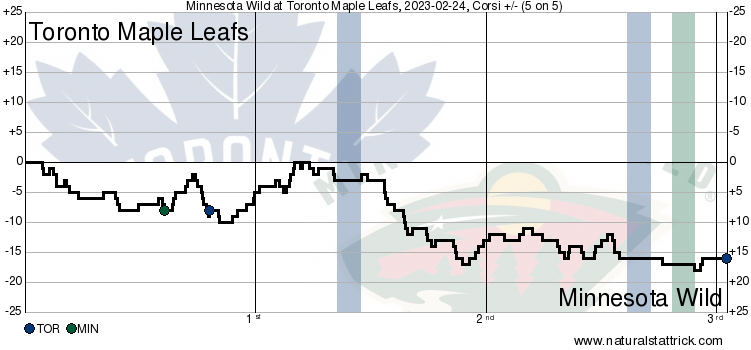If you managed to stay awake through the slog that was the first 60 minutes of this game, William Nylander rewarded you with a brilliant overtime winner in the Maple Leafs’ 2-1 win over Minnesota.
Your game in 10:
1. A preview of what was to come for the rest of the 60 minutes, the first period was a dull and cagey affair, although it did feature the only two goals scored in regulation.
The makeup of this game was starkly different from the recent matchups against the Buffalos and Chicagos of the world. Huge portions of the game were played along the walls as the Wild played a simple dump-and-chase game with remarkable consistency and established a heavy forecheck early and often.
Unlike Tuesday night in Buffalo, there was next to nothing on offer in terms of transition opportunities or rush offense. The Wild were really disciplined, hard-working, and structured inside all three zones.
There was zero easy offense to be had tonight. Whatever the Leafs were going to get in this game offensively, it was going to be earned the hard way.
2. The Leafs, for their part, were defending well in their own right and stayed patient offensively. They didn’t seem too overwhelmed in this kind of game, although they weren’t exactly thriving in it, either. Each period was pretty similar statistically in terms of the Wild edging the Leafs in shot attempts and scoring chances at five-on-five.
Especially in the opening 40 minutes, there were a few too many shifts where the Leafs were bull-rushed off of pucks by the forechecking of the brawnier Minnesota forwards and then couldn’t get the ensuing cycle killed quickly enough to get back on offense and tilt the ice consistently in their favour. The result was little offense generated to the tune of just 1.46 xGF for the Leafs over the duration of the 60 minutes.
With the rejigged pairings in Rasmus Sandin‘s absence — Morgan Relly with Justin Holl and TJ Brodie with Conor Timmins — there was some concern on my behalf as to how the Leafs would handle the Wild’s forecheck. It certainly wasn’t the prettiest at times, but the Leafs’ five-man defensive concept was strong again.
The Wild tried countless jam plays and odd-angle shots working from behind the goal line in this game, which meant the Leafs’ forwards had to spend a lot of time defending low in the zone and around the front of their net. For the most part, they did a good job of staying committed and creating layers for the Wild to have to go through.
The Leafs blocked 26 shots as a team (their season average is 14.5/60), including 15 from their six defensemen. It wasn’t always picture-perfect, but credit to them for finding ways to keep pucks out and answering the call for what was needed to win this kind of (some might call it playoff-style) game.
3. Unsurprisingly, the Wild scored their lone goal of the game from behind the goal line in the greasiest fashion possible — a bounce off of a skate and in past Ilya Samsonov at his near post, a goal no one knew was a goal until after a review.
The Leafs also generated their only goal in regulation on a play from behind the goal line, capitalizing on a rare instance of Minnesota affording them some space in front of the net. Kirill Kaprizov missed picking up the puck after Mark Giordano slid it down the wall, William Nylander set up behind the net, and #88 found David Kampf in some space in between the Wild’s inexperienced pairing of Caleb Addison and Dakota Mermis to lift one past a dialed-in Filip Gustavsson.
He really does know the best Kämpfing spots ⛺️ pic.twitter.com/gsc4DWUmsZ
— Toronto Maple Leafs (@MapleLeafs) February 25, 2023
Kampf’s offense is quietly — and finally — picking up of late with two goals and three points in his last four games. He had zero goals and six assists in his previous 27.
4. And that was it for regulation scoring in this game. In terms of entertainment, we had to search far and wide for it, settling mostly for gritty wall battles, Ryan O’Reilly faceoff wins, Mark Giordano shot blocks, or instances of soccer-style defending — e.g. Mitch Marner handing off his stick to Justin Holl and then making a slide-tackle-style interception with his feet, or Auston Matthews losing his stick, intentionally stepping on the puck, and performing a Maradona move around a Wild player before kicking it back to Tavares in the middle of the defensive zone (that one briefly woke the home crowd up).
Defensive play also won out on the three power plays in the game as both penalty kills entered the game hot and kept their streaks alive.
5. In addition to Mark Giordano‘s shot-blocking record, the other focus to pass the time in this game was Ryan O’Reilly‘s faceoff numbers, which were even more dominant than usual tonight at 15 for 18, including five for six in the defensive zone.
He is obviously really strong on his stick in general and has great attention to detail, but his use of a long-bladed stick with essentially no flex also seems to give him an added edge on the dot, especially in those second-effort battles. Beyond the wacky toe curve, past teammates have marveled at his ability to play with a stick so stiff (it’s something he’s attributed to playing with hand-me-downs from his older brother, Cal, growing up).
The Leafs created a couple of looks off of O’Reilly draw wins, including one of their best scoring chances of the entire game. John Tavares got a good jump off the draw and dropped it back for Mitch Marner, who had the goalie beat but slid it wide.
The coaching staff is also now able to start with O’Reilly at the beginning of three-on-three overtime instead of David Kampf, which doesn’t have any relevance at playoff time, but it is a nice bonus for games like tonight when three-on-three comes into play.
6. Speaking of draws, the Leafs took 14 in the defensive zone tonight, and 13 of them were taken by either David Kampf or Ryan O’Reilly, who took six.
Auston Matthews took just one in the defensive zone. He has taken just 10 defensive-zone draws in four games since the addition of O’Reilly, which is a notable reduction from his average from before the trade.
Even-strength ice time per game over the four games with ROR in the fold is really close to even between the top two lines — Matthews is averaging 15:15/game and O’Reilly is at 14:53/game. Prior to the trade, the gap was over two minutes between Matthews and Tavares (16:18 vs. 14:01).
I definitely see the logic of a three-deep setup with ROR driving the third line as the Leafs’ best look against the depth of Tampa or Boston, but there would be a balance for Keefe to strike here. If he’s using ROR or Kampf as much as he wants in defensive-zone situations, it makes it a little more challenging to keep the shift counts as high as he wants for his stars in the top six. Ultimately, though, they will need three lines rolling in the playoffs.
7. In overtime, the Leafs are finally starting to collect these extra points with consistency — as a team with their offensive weapons should — after squandering so many of them earlier in the year. They’ve now won five of their last six overtime periods after losing six of seven to start the season.
One part has been the focus on winning the initial draw and the personnel to start overtime, although they actually didn’t start with the puck this time initially. Outside of the opening faceoff, though, there is a noticeable difference in their approach to OT compared to earlier in the year.
Their stars are more disciplined about shift length and are staying more patient about holding onto pucks while waiting for their opportunity to attack a defender one-on-one in space, rather than rushing plays and forcing fancy no-look passes for turnovers (which we saw too much of earlier in the year).
There have been some good adjustments made by both the coaches and players with a notable benefit in the standings as the home-ice race with the Lightning threatens to come down to the wire.
8. On William Nylander‘s OT goal, there was a drop pass option to Auston Matthews, but he protected the puck, dropped his shoulder, and attempted to drive the net — which is a willingness he has taken to a new level this season, in general, as he enjoys career highs offensively (not just in OT but at five-on-five as well).
It was actually a good defensive effort by Minnesota’s Frederick Gaudreau initially, but Willy the pick-pocketing thief earned the last laugh. He’s such a powerful skater and so slick on his edges, and combined with one of his outstretched one-armed stick lifts from behind, Gaudreau didn’t know what hit him.
The skill, patience, and composure on the finish after the puck recovery were immaculate. It made it worth suffering through the regulation period.
WILLIAM.
ANDREW.
MICHAEL.
JUNIOR.
NYLANDER.
ALTELIUS. pic.twitter.com/BUjf9cLeIB— Toronto Maple Leafs (@MapleLeafs) February 25, 2023
That’s three OT winners this season for Nylander, tied for the league lead.
9. On a record-tying night for all-time shot blocking (at least as far back as the records go, which is to 2005-06), Mark Giordano deserves his flowers tonight as much or more than any night. It was not an easy evening to be a Leafs defenseman retrieving pucks against the likes of Jordan Greenway, Marcus Foligno, Ryan Reaves, Joel Eriksson Ek, Ryan Hartman, and company (ROR, with his experience in the Central Division, accurately predicted the team would be sore after this game).
Giordano took some hard hits on retrievals and was relentlessly competitive throughout the game in the countless skirmishes along the walls, in addition to clogging up shooting lanes with consistency as per usual. Jake Muzzin is definitely missed, but Muzzin’s absence makes the value and appreciation for what Gio brings in these areas of the game that much more pronounced, especially on a night like tonight.
Giordano grabbed an assist on the Leafs’ lone regulation goal, to boot.
10. It was a bit of a shaky start to this game for Ilya Samsonov, who nearly created the goaltending blooper of the season when he got caught leaving his net for an anticipated dump-in from center that was sent toward the far post by Ryan Hartman (it hit the inside of the post and went clean through the crease).
The Wild goal was unlucky with the bounce off of the defenseman’s skate, although Samsonov seemed a little out of it on the play and wasn’t snug to his near post. He settled in nicely from there, with his best work of the game coming on a couple of big saves on the late power play for the Wild to preserve the point.
Quietly, Samsonov was hovering at a .898 save percentage in his previous seven starts coming into tonight. A .960 SV% and a W is a good confidence builder to take on the road trip.



































![New Leaf Anthony Stolarz on the opportunity in Toronto: “In Florida, I knew my role as a backup… Now, [Joseph Woll] and I are competing for starts… As a goalie, that’s all you can ask for” Anthony Stolarz, Stanley Cup win, now Maple Leaf](https://mapleleafshotstove.com/wp-content/uploads/2024/07/anthony-stolarz-sc-100x70.jpg)
